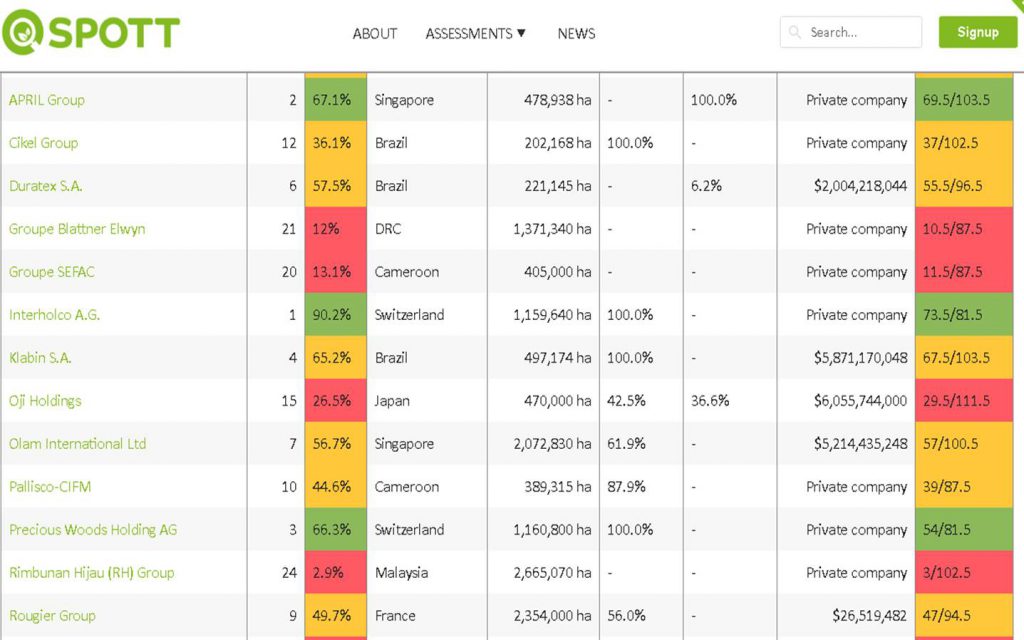APRIL Group Ranks Second in Policy and Transparency Assessment from Zoological Society of London
The Zoological Society of London (ZSL) has released the results of its Sustainability Policy Transparency Toolkit, or SPOTT Assessment, that independently gauges the progress of 24 global timber, pulp and paper companies against a range of environmental, social and governance (ESG) indicators.
APRIL ranked second of 24 companies, behind Switzerland’s Interholco A.G., with a score of 67.1%, well above the average score for the sector of 37.1%. APRIL’s highest scores were for Sustainability Policy and Leadership, and Deforestation and Biodiversity. Just three of the 24 companies received a ‘Green’ rating, awarded to companies scoring above 66%.
The SPOTT assessments and the accompanying detailed company reports are designed to promote ‘transparency and accountability to drive implementation of environmental and social best practice for the sustainable production and trade of global commodities’.

SPOTT scorecard
APRIL Director of Sustainability and External Affairs, Lucita Jasmin, said the assessment was important because it set an “independent baseline on which we can build further improvements in transparency and reporting. We welcome third party assessments that are based on clear framework and criteria, and where the process itself was transparent to the participants,” she added.
ZSL is an international scientific, conservation and educational charity whose mission is to promote and achieve the worldwide conservation of animals and their habitats.
Read the full announcement from SPOTT below:
Assessing transparency in the forestry sector
Chris Eves | 09/11/2017 | London, UK
International conservation charity ZSL (Zoological Society of London) has today announced the expansion of its pioneering sustainable commodities monitoring platform, SPOTT (Sustainability Policy Transparency Toolkit), to cover the timber, pulp and paper industry, following three years of success encouraging greater transparency in the palm oil sector.
Launched in 2014 to provide investors with intelligence on whether and how key palm oil producers are setting and reporting on their environmental and social commitments, ZSL has now added timber, pulp and paper producers to the platform as part of longer-term plans to expand the range of commodities covered by SPOTT, which was recently shortlisted for a Responsible Investor award.
ZSL’s new SPOTT assessments gauge the progress of 24 timber, pulp and paper companies – all of whom have significant operations in highly-biodiverse and threatened tropical landscapes across the globe – against a range of key environmental and social sustainability indicators.
By encouraging best-practice in industries that can have significant impacts on wildlife habitats and ecosystems, as well as livelihoods, SPOTT contributes towards ZSL’s charitable mission of achieving the worldwide protection of animals and their habitats.
Mike Hoffmann, Head of ZSL’s Global Conservation Programmes, said: “We’ve already seen the impact of SPOTT in the palm oil sector, with more and more investors using the assessments to inform their due diligence and risk assessment activities and many assessed companies gradually showing an improvement in their scores over time.
“We’re now hoping to replicate this success within the timber, pulp and paper sector, where our aim is to support a greater culture of transparency, enabling investors to better gauge risk and engage productively with key players in the forest products industry.”
The expansion of the platform into timber, pulp and paper commodities marks the first in-depth evaluation of its kind in this sector, allowing investors to scrutinise how individual companies are responding to expectations and taking steps to mitigate their environmental, social and governance (ESG) risks.
ZSL’s assessments show that levels of transparency in the timber, pulp and paper sector vary greatly, with some companies scoring extremely low when assessed against SPOTT’s indicators, while others fare comparatively well. Of the companies assessed, two-thirds have a commitment to set aside areas for conservation. However, less than a third are implementing a landscape-level approach to biodiversity conservation – a crucial tool for addressing complex environmental and social challenges linked to the industry. Another such challenge is respecting the rights of indigenous communities, something that 16 of 24 companies surveyed have committed to do – although only five companies commit to fully consult with and gain the consent of these communities.
Chris Eves, ZSL’s Forestry Officer, said: “We’ve had a really encouraging response from those companies we’ve engaged during the initial round of SPOTT assessments of timber, pulp and paper producers, as the industry increasingly recognizes the advantages of increased transparency. Though many have scored lower than expected in our initial round of assessments, based on our experience in the palm oil sector we expect to see relatively rapid progress during future surveys, as companies move to implement the rigorous environmental, social, and governance-related commitments and disclosures that investors increasingly expect.
“We also found that more than half of the companies assessed are already actively working with government, NGOs or academic institutions to improve the sustainability of forest products, suggesting that the sector is taking these challenges increasingly seriously.”




